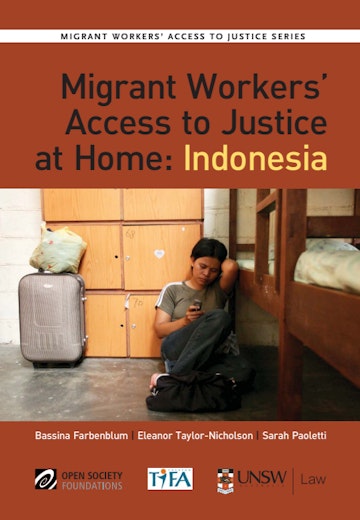For Indonesian Migrant Workers, Problems Start at Home
By Elizabeth Frantz
With Qatar on the cusp of a building boom in preparation for the 2022 FIFA World Cup, the media spotlight is shining brightly on its treatment of migrant workers, who make up 94 percent of the workforce.
Last month Amnesty International released a report cataloguing labor rights abuses in the Qatari construction sector. The report described workers having their pay withheld for months or not being paid at all, working in dangerous and harsh conditions, and living in squalid, overcrowded accommodation. This comes a week after Francois Crepeau, UN Special Rapporteur on the Human Rights of Migrants, ended a week-long visit to Qatar by joining the chorus of voices calling for labor reforms in the Gulf state.
Although the situation in destination countries such as Qatar is garnering more media attention, the problems migrants face often start at home, in their countries of origin where the recruitment process begins. And yet little has been said about the crucial role played by the labor brokers and other middlemen who facilitate transnational recruitment and who, in varying degrees, profit from migrants’ exploitation.
Migrants’ countries of origin earn handsomely from the remittances migrants send home, which often exceed the sums they receive in foreign aid. What obligations do they have to ensure that private recruitment agencies, labor brokers, and other middlemen operating in their countries do not breach migrants’ rights? Should they be taking bolder steps to regulate the recruitment industry?
A team of academic researchers have released the results of the most comprehensive study to date examining these questions. The research, funded by the Open Society International Migration Initiative and the TIFA Foundation, and conducted through the University of New South Wales Law School and the University of Pennsylvania Law School, focused on the plight of workers migrating from Indonesia to the Arab region.
But the problems it describes are not unique to Indonesia, and the insights and recommendations are also of value to advocates involved in addressing the plight of migrant workers from other countries. Their findings are a timely reminder of the fact that bolder measures need to be adopted by migrants’ countries of origin to erect a framework to regulate the activities of recruiters.
More than half a million Indonesians migrate abroad each year to work for foreign employers on two-year employment contracts. About half of these migrants go to work in the Arab region, particularly the oil-rich Gulf States. The migrants are predominantly women, many of them hired to perform domestic work in private homes. They typically hail from rural areas and have only a primary school education and limited formal work experience.
The researchers found that many of the problems Indonesian migrants experience begin at the point of recruitment, before they even leave home. For example, many are misled by labor brokers about their wages or conditions abroad or are charged excessive recruitment fees. Many of the abuses can be linked to a lack of transparency and accountability in migrants’ recruitment by private firms, as well as to a failure to provide migrants with adequate information about their rights prior to departure. Thus, the researchers report, government and private actors in the home country, in many instances, bear or share responsibility for the abuses migrant workers suffer while abroad.
Indonesia’s government has introduced a number of measures over the past decade to regulate the recruitment of the country’s citizens as workers overseas. It also has developed processes and programs to enable migrant workers to obtain redress in Indonesia for wrongs committed abroad.
Despite the introduction of these measures, migrants still face significant obstacles in obtaining redress. Most participants in the study expressed disappointment and frustration with the existing legal and institutional arrangements, saying that the mechanisms designed to offer redress were either ineffective or inaccessible.
Few cases have been brought before Indonesia’s civil and criminal judicial systems against private individuals and recruitment agencies due, among other things, to high costs and perceived judicial bias and corruption. Most statutory rights and obligations lack enforcement mechanisms, and existing laws do not focus on addressing worker complaints or on the accountability of recruiters for preventing and redressing wrongs the migrant workers suffer.
The most frequently used redress mechanisms, such as administrative dispute resolution processes, often yield unsatisfactory or unfair outcomes for workers, in part because they lack standardized procedures, transparency and meaningful oversight.
The good news is that steps could be taken almost immediately by the Indonesian government to address many of these problems. One area, for example, relates to Indonesia’s migrant worker insurance program.
Indonesia has a privately run scheme through which all migrant workers are required to obtain insurance as a condition of migrating abroad. As the researchers describe, the scheme is broad in scope and could, if it functioned more effectively, provide financial coverage for many of the problems workers experience during employment abroad.
Yet while all migrants are required to pay for policies, few ever receive compensation for losses. Most are not informed about their coverage and procedures for making claims. Those who are aware of the program are stymied by unfair exclusions and practical challenges in submitting claims from abroad within the one-year filing deadline.
As the report points out, a number of reforms could be made to improve the program. The government could, for example, require insurers to make the claims process simpler and easier to navigate. Civil society and government bodies could work together to publish and make freely available simple information on the insurance policy and claims process to enable more migrants to use it.
While much attention has been paid to the plight of migrants in destination countries, this study demonstrates the critical role that actors in Indonesia and other countries of origin can play to minimize the risk of exploitation and ensure that migrants’ rights are better protected.

Elizabeth Frantz is acting co-director of Equity at the Open Society Foundations.


